COLD SMOKE GENERATORI have been making
summer sausage and other
smoked sausage
products for over two decades and the area that requires the most attention
for my humble operation has been applying hickory smoke to the smoker
cabinet. The problem is keeping a good supply of smoke without
increasing the cabinet temperature, whereas if your cabinet temperature goes
above 165 degrees F. for an extended period of time, you start to render the
fat content of the sausage into grease which ruins the sausage.
External smoke generators have been around as long as folks have been
smoking sausage products and some are very pricy and many are just
"plain
Jane" models aka low tech with marginal results. I researched the
internet and found plenty of YouTube
videos showing various designs and
ideas and went down the low to middle of the road as far as technology goes.
In a nut shell, you have to have some method to move air, a chamber to hold
the fuel source; e.g., wood chips, pellets, sawdust, etc. and a means to
ignite the fuel used and to pipe the smoke into your smoker cabinet.
The movement of air in this type of smoke generator is more or less the
venturi effect. If this smoke generator does not perform as expected, I will spend about 400
bucks on a commercial
smoke generator mainly used for the sawdust
medium. Since I am creating this page after the fact, that will not be
necessary at this time.
I purchased an aquarium air supply, stainless steel canister for the
fuel chamber, stainless steel mesh wire, various 1/2 inch
NPT pipe fittings, brass hose barb, stainless steel bolts and nuts.
I already had a piece of scrap 3/8 inch outside diameter copper tubing and
only had to cut it to the proper length. You don't have to use a drill press but it makes drilling the holes in the
stainless steel canister much easier.
Below is pix of some of the raw materials:

The first order of business was to cut a 3/4 inch diameter hole in the
lid of the stainless steel spegatti container for the 1/2 inch NPT iron pipe "T"
connection. I had to remove the small handle that went across the lid
that was spot welded in place and used an antique Dremel tool with a friction cut-off blade which worked
fine. I then used a 120 degree single flute countersink to get a hole started, drilled a 15/64 inch diameter hole and used a 3/4 inch diameter
Greenlee hole punch to enlarge the 15/64 inch diameter hole to 3/4 inch.
You could use a
step drill bit to accomplish the same
thing.
Click on thumbnail pixs below for a larger screen view:
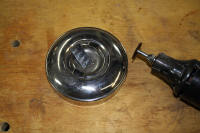
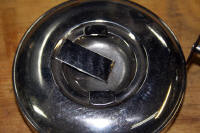
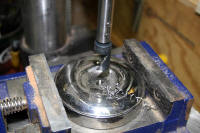
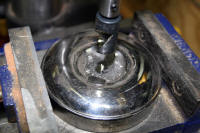
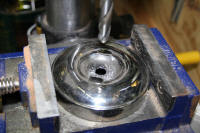
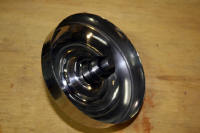
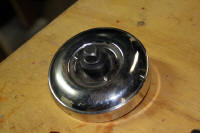
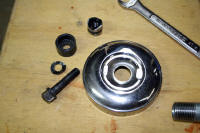
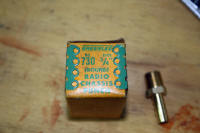
GOING BACK IN TIME TO THE 1970s
The above Greenlee 3/4 inch diameter hole punch along with a Greenlee 5/8 inch
diameter hole punch were loaned out to a local ham radio operator back in the
1970s,(now deceased) and it took nearly thirty (30) years, maybe longer asking him to
return them without success. I finally embarrassed him in front Bill Donathan,
proprietor of Smith's Cleaners one day while picking up some clothes and followed the dude home across town and
took possession of my hole
punches. He had no trouble finding the hole punches and knew exactly
where they were. He did not have any intention of ever returning those
hole punches.
I have had very bad luck over the decades loaning out
tools and various things of which most I never got back loaned out as
early as 1964 being a set of York barbells, dumbbells, extra 45 lb. weights and have received all
kind of excuses as to their current whereabouts.
I loaned a book that
was a study reference for the FCC commercial maritime radio exam while I was
in the US Navy about 1967 to a Senior Chief Petty Officer about to retire
who was killed in a private airplane crash, of which I never got the book
back.
I still remember two
animal live traps, steel jaw traps, trapping books and manuals, archery and
knife making books, post hole diggers,
short handle shovel, car jack, etc., that have acquired new homes never to return.....grin if you must!
I loaned a
DeVILBISS EGA-502 spray gun out and when I finally got it back, the
threads for the air gage and/or air fitting were stripped out and had to
replace the entire spray gun.
I had a "friend" store a 400 pound +-
Universal brand commercial
food mixer in his out building/barn before 1989 and when I went to get
the heavy mixer years later, he
could not find it in the barn, imagine that! It took both of us to load and
unload the large floor model mixer using an incline wood ramp. That was the end of that
"friendship" as far as I was concerned.
His spouse was upset because I didn't attend his funeral!
It took over fifteen (15) years to
get a fly fishing book back from one of my cousins, (now deceased) and was
badly worn with water stains.
I also loaned a White's Electronic Metal
Detector (High Dollar Unit) to a Brother-in-Law and got the metal detector
back, but not the charging supply. The above are some of the things I
remember and I am sure there are others. Family and friends
are the culprits because I doubt you would loan something to a stranger!
You can also use the same analogy when loaning aka giving away money!
"Experience is a tough teacher, but the lessons learned stay with you
forever." I got a chance to vent and that is a good
thing to do every once in a
while without getting belligerent and bellicose;
I had much rather grin
instead!
I remember a couple trades back in the mid 1970s when I had my musical
parts and accessories mail order business and did a set of inlays for a well
known musician and banjo builder (now deceased) in the Eastern Panhandle of West Virginia. He was pleased with the inlays and offered
to trade a piece of curly maple for another set of abalone inlays. I shipped
the inlays to him and never got the curly maple banjo neck wood and he never
responded to my letters or telephone calls. He has been dead quite a
few years. To not be confused with my friend Davis Kennedy, the man's
first name was Andy....
Also, there was an individual in Narrows, Virginia that did
some machine shop work for one of my friends Davis Kennedy (now deceased) in Athens, West Virginia and was highly
recommended. I had my friend trade him 300 dollars worth of parts
and/or banjo inlaid fingerboard and pegheads that I left with him who
delivered the items to trade for building me a stainless steel drill fixture for the
Gibson pre-war
tube. Never got the drill fixture, however my friend offered to pay
for what his friend did not deliver, but I told him
"No", it was the other persons
responsibility.
There are many dishonest people and sooner or later you will get some
experience from dealing with them! I still have that archived unpaid
invoice dated 06-03-76 in my friends file from West Virginia of which I sent
the invoice to the person that lived on Rowland Street there in Narrows,
Virginia which was a wasted postage stamp.
MOST RECENT RIP OFF
I guess my most recent rip off was in early 2008, whereas I sent one of
my custom calls to a man in California to trade for him doing a video of him
using the call; a type of instructional video to post on my website.
He was impressed with the call, however I never got a video from him with
several excuses, etc. and finally lost contact with him. I have an
audio file of him playing one of his Neil Cost calls he had for sale on EBay
linked
here. Seems like I am a
"blue fin sucker" and trust
people far too much, but being raised in a Christian family, one does trust
people. Working in a Prison environment for 33 years will manifest
human nature, the negative carnal side for sure!
Leaving this paragraph on a positive note, I have some friends that I
have loaned things to and received them back in a timely manner, but that is
the exception to the rule and I certainly do respect individuals of that
moral character and fiber.
THE BEST 35 DOLLAR INVESTMENT TO DATE
One of the best investments I made in the early to mid 1970s was
repairing a fellow musician's Gibson flat top guitar, replacing the bridge
and after the repair and receiving only partial payment, he still owed me
about 35 dollars, not exactly sure of the amount, but think I am correct.
Before finishing this investment story, I played Dobro guitar with his
part-time band and one Sunday, the guy showed up with a couple car loads of
the band members and their families unannounced
and stayed the entire day. My bride used up a weeks worth of
groceries trying to feed the hungry crowd and there were several young kids
with them too. Their kids tore up our son's favorite music box and had
our kids toys strewn out in the back yard and field.
After that infamous visit is when I did the guitar repair for the band
leader. I was still working with the NC Telephone Company and when I
would have to travel to Matthews, NC for something job related, I would stop
by his home and small antique business there in Waxhaw, NC on Highway 73 and before I would get to
their front door, I could see the curtains move and knew that someone was
home and his station wagon was also in the driveway, however he never came
to the front door! He was a well known musician there in Waxhaw, (now
deceased) for many decades.
I never saw the guy after that guitar repair and that is one of the best
35 dollar investments I have ever made. I also loaned them several LP
vinyl Bluegrass albums and forgot about those until now!
WHY I DON'T LOAN OR BORROW ANYMORE
The above are some of the reasons I do not loan out items anymore and
avoid borrowing things as well, because most of the time when you borrow
something, it inevitable will break down on you.
Murphy's Law
never sleeps.
BACK TO THE SMOKE GENERATOR CONSTRUCTION
It is just my nature to get side tracked when writing and now back to the
smoke generator construction. After the 3/4 inch diameter hole was punched into the lid, it was time to
start the assembly of the 1/2 inch NPT iron pipe which draws air (smoke) from the fuel
source chamber and moves it into the smoker cabinet. The air supply
comes from a Sonic model 9908 air pump and I used a 1/2 inch NPT reducer to
accept a 3/8
inch x 5/16 inch brass hose barb although many use a portable air compressor
which does circulate more air flow. The air tube from the air pump fits
inside the brass hose barb real snug but had to enlarge the existing hole in
the threaded portion of the brass barb using a 3/8 inch diameter drill bit to fit a 3/8 inch outside
diameter copper tube to facilitate the movement of air (create a draft) through the 1/2 inch
NPT iron pipe. The copper tube output has to be on the other side of the
T to effect drawing air from the fuel chamber. I fabricated a couple
1/2 inch NPT nuts from a right angle fitting and used my Milwaukee PortaBand saw to
remove a portion of the threaded ends which functions as a nut.
Regular bolt nuts will not work because pipe threads are tapered to allow the
threads to compress against each other creating a tight seal for usage with liquids or gas.
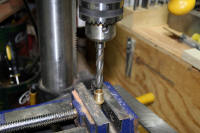
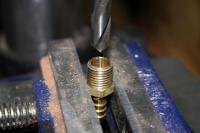
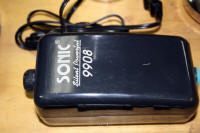
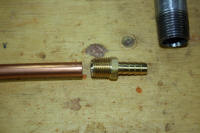
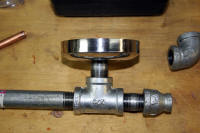
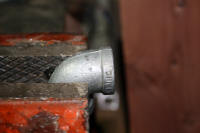
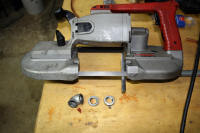
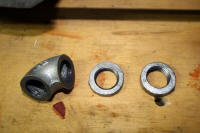
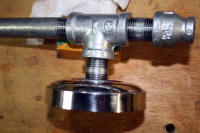
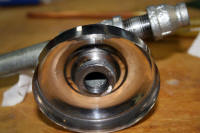
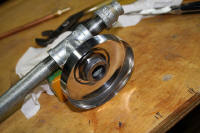
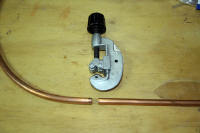
The spegatti stainless steel container needed holes in the base for air
flow and also holes in the side to ignite the fuel source which in my case
is hickory sawdust. Also, I used 1/4 x 20 x 1 inch length stainless
steel bolts and nuts to be used as legs to allow for the air flow and stand offs to
support the stainless steel mesh wire screen. I ordered
some stainless steel # 20 mesh wire to have the sawdust suspended off the
bottom of the container for better air flow. I later ordered # 30 mesh
wire screen because the fuel chamber was not getting enough air flow even
though I opened the wire mesh openings by using an ice pick aka weapon of choice
used back in the 1950s by some demographic groups locally.
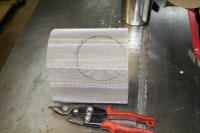
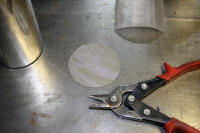
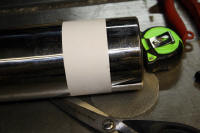
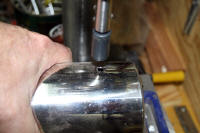
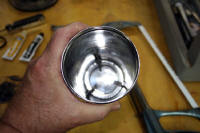
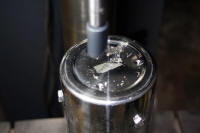
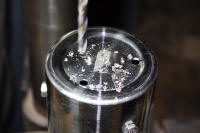
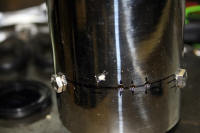
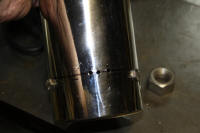
After the bolts were installed for the legs and the screen wire mesh fuel
support, it was time to give the unit a field test. To ignite the fuel
source (hickory sawdust), I used a propane torch and applied the flame to
the holes that are drilled into the side of canister for that purpose that are located where
the sawdust terminates on top of the stainless steel mesh screen. First impression
was that it wasn't getting enough air flow and opened the holes up in the
mesh wire screen which did help. I later made a circular mesh wire basket
without a bottom; sides only to contain the sawdust which left an air space
between the sawdust and the walls of the canister which did help but it still wasn't quite enough. I
then
ordered # 30 mesh wire screen which worked much better.
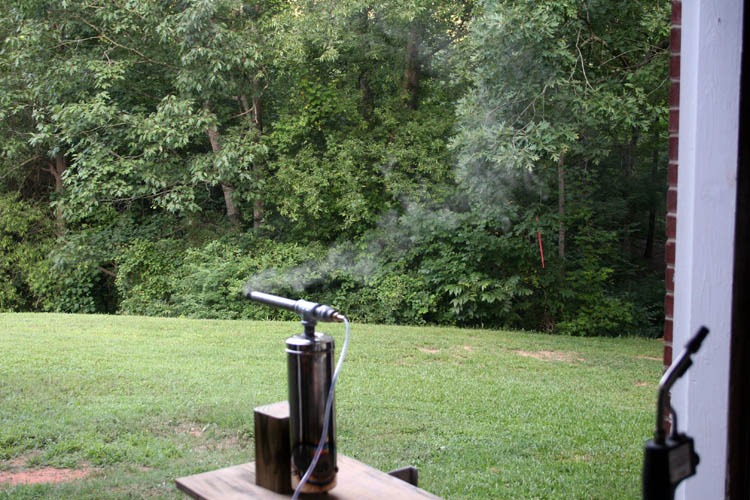
The # 30 mesh stainless steel wire bottom screen in operation above.
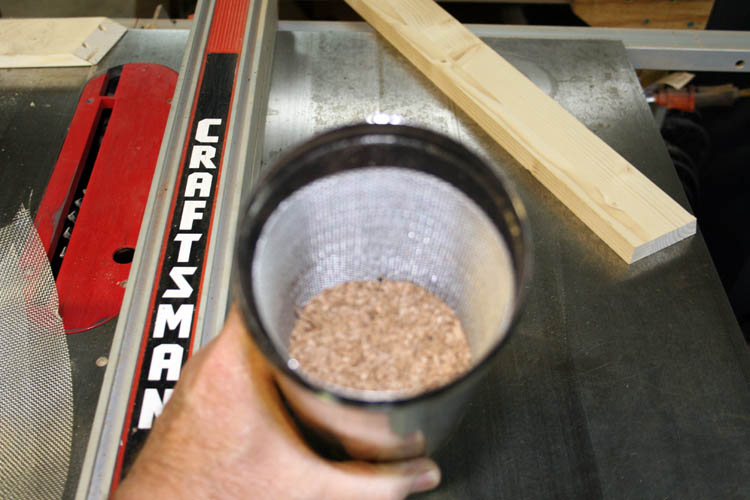
Above pix of the stainless steel # 30 mesh wire basket which has about
1/4 inch space between the walls of the container. It was secured into
a circle by a
piece of 16 gauge soft annealed wire.
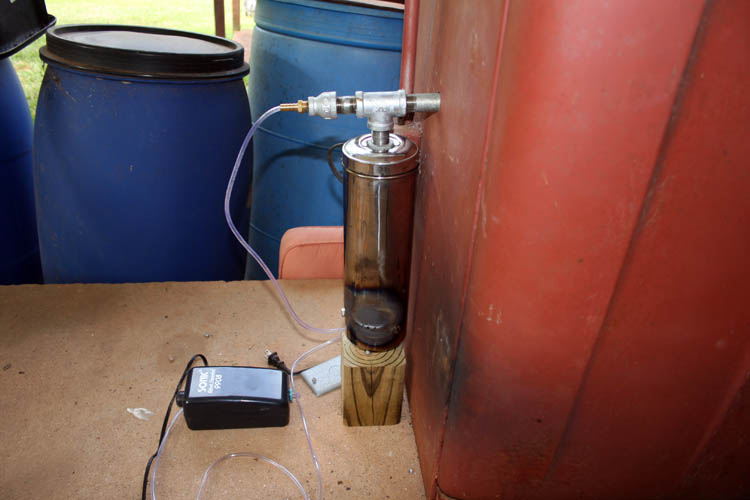
I used a cheap step drill bit to bore a 7/8 inch hole into the outside of
the smoker cabinet which was about right and went
"brain dead" on boring the
inside hole which I bored out to 1 inch in diameter that was 1/8 inch
larger than needed but it worked ok even with the extra slop. The inside of
the ole 1953 International Harvester refrigerator cabinet has a very heavy
enamel coating and very difficult to bore the hole with the step drill bit but finally got it cut.
I will cover the top of the 4 x 4 wood support block with a piece of sheet
metal for extra safety aka fire prevention since the bottom of the canister
does get hot.
FIELD TESTING THE SMOKE GENERATOR
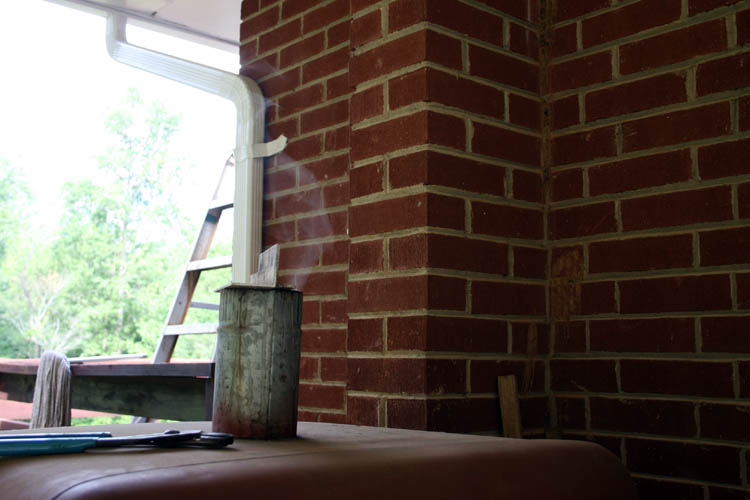
You can see the smoke coming from the smoker cabinet which the home made
damper is 3/4 of the way closed.
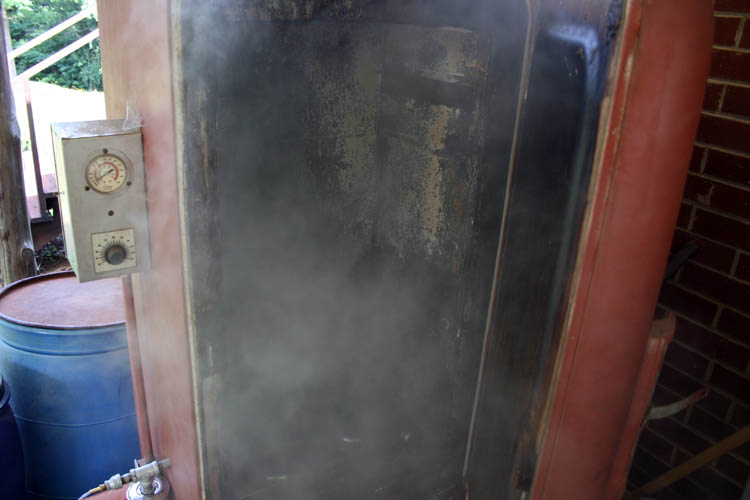
I opened the smoker cabinet door and took a quick pix before the smoke went into thin
air. I believe this smoke generator will supply plenty of hickory
smoke for doing a batch of Venison Cajun Blend Summer Sausage with just one
fill of hickory sawdust. The sawdust basket was not filled up
and will later measure how much the basket will hold and also how long a
single burn time is. I fired it up around 0820 and it is
still generating cold smoke and it is now 1:41 P.M. The smoke coming
out the tube is less than 125 degrees F. and is definitely classified as
cold smoke. The only problem with these types of cold smoke generators
including commercial ones, is a built up of tar inside the smoke chamber,
around the lid and exhaust tube which will have to be cleaned once the build up is a
problem.
I have ground venison and some Boston butt meat thawing out to start a 30
pound batch of my Venison Summer Sausage
Cajun blend this evening which has to rest in our basement game refrigerator for at least
80 hours and will begin the regrind, stuffing and smoking process this
coming Saturday which takes another 24 hours to complete. Sausage
making is definitely a labor of love.
Web published by Bill aka Mickey Porter on 06-21-16.
SMOKE GENERATOR IN OPERATION
I started the final stages of a 30 pound batch of my Venison Summer
Sausage - Cajun Blend on the morning of 06-25-16; e.g., regrinding, stuffing
into fibrous casing and placing the stuffed casings onto the racks of the
above homemade smoker. My biorhythms were way off today but managed to
get by with a few glitches along the way like loosing my grip on the
stuffing tube/fibrous casing and having the handle on the 18 pound stuffer
come off when doing a fast reverse of the handle to relieve pressure on the
stuffed casing in order to remove it from the stuffing tube and then twist
the end finishing off with a hog ring in hog ring pliers. I just had
to grin at myself and keep on going.
Everything started looking up until it was time to start the smoke
generator and I knocked it over a couple times while it was on the concrete
floor and had to scoop up the hickory sawdust placing it back into the smoke
generator wire basket. BTW, the wire basket in the smoke generator
chamber holds 4.5 cups of sawdust and burns for a good 4 hours.
To stay on the negative biorhythm cycle, my latest digital thermometer
started reading 273 degrees sausage temperature, whereas the actual sausage temperature was 133 degrees F. and the digital thermometer was in operation
less than eight (8) hours. I had to make a trip to Walmart and purchase
another one. I had an old one by Pyrex brand but wanted to use the
same brand that I am currently using. The braided cable and probe is definitely bad and will
get my money back for that one.
I was totally stoked and impressed with the way the smoke generator was
"coughing" smoke through the smoker cabinet and it billowed smoke like a
small wood burning steam locomotive going up a steep incline for a couple hours and then settled down
into a good steady smoke stream until the hickory sawdust was finally spent.
Below pix taken at 5:18 P.M. of the casings hanging in the smoker while I
loaded another 4.5 cups of hickory sawdust in the smoke generator fuel
chamber. You do not need to open the smoker cabinet door when
refilling fuel in the smoke generator but wanted a pix for this short story. One filling of sawdust would normally suffice but wanted to
go for the extra hickory smoke flavor gusto this time. With this smoke
generator, you more or less,
"Set it and forget it" like an ole Ronco commercial.
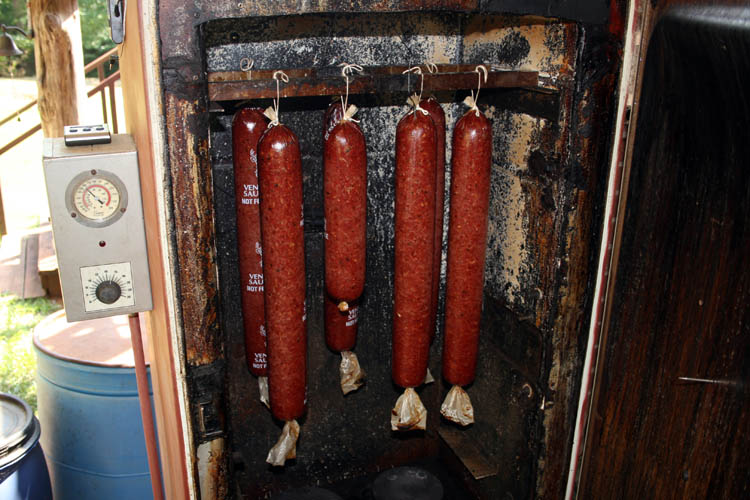
The summer sausage will take at least 12 additional hours with the smoker
cabinet temperature at 160 degrees F. to get the internal sausage
temperature to 152 degrees F. So far, the thermostat is working as it
should regulating the smoker cabinet temperature, plus or minus 5 degrees F.
The insulated cabinet space between the inner and outer wall of the ole
heavy metal refrigerator really holds the heat in. It might
prehistoric, but
this contraption works great!
Web published update by Bill aka Mickey Porter on 06-25-16.
SUMMER SAUSAGE COOLING ON RACK
This batch of summer sausage was completed in 19 hours at 0240 AM in the
morning of 06-26-16 and attribute that to the smoke generator moving air aka
smoke and heat throughout the smoker cabinet more efficiently. I kept
the smoke generator going for 15 hours, however the last 6 hours it was not
generating any smoke, just moving air. Normally, it takes
upwards of 24 hours to bring the internal temperature up to 152 degrees F. for
3 inch diameter fibrous casing that are 27 inches in length.
I removed the summer sausage from the smoker and placed it on the
aluminum drying/cooling rack outside and showered the beautimous looking
casings with running tap water for about 5
minutes to cool it down to prevent some shrinkage. The sausage and
rack were moved inside my basement woodworking shop and let the internal temperature
cool down to 110 degrees F. I then hung the sausage casings in my basement
game refrigerator where they will rest for 18 to 24 hours and then vacuum seal and
freeze for later usage.
I completed a worksheet documenting the procedures for those that are interested in the step
by step procedures used. The worksheet is hyperlinked
here in .PDF format.
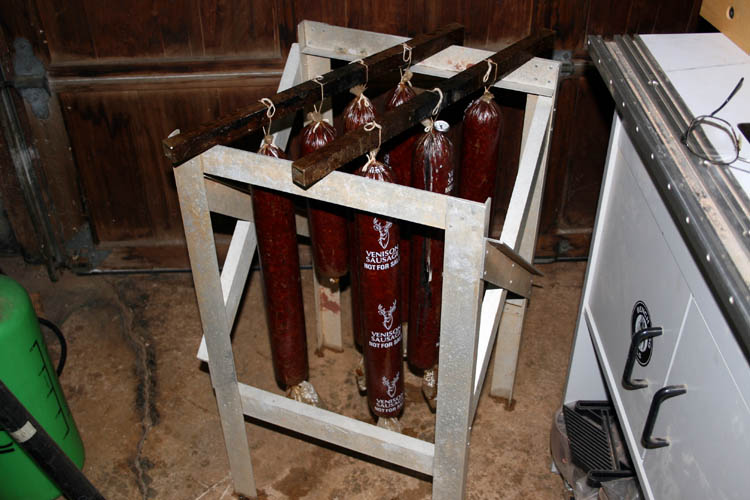
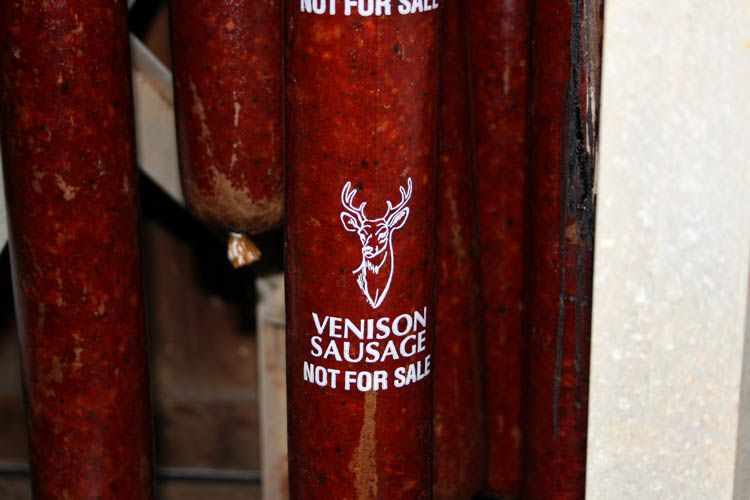
This morning for breakfast, I fried some of the summer sausage that was
left in the bottom of the stuffer and stuffing tube that I placed in a zip
lock type bag in the refrigerator and it definitely had an excellent Cajun
cayenne pepper taste bud
wakeup call to it. I will field test
(critique) the smoked summer sausage when I cut
the full length casings in half and quarters for freezing.
This afternoon, I cut the casings in half and a couple in quarters and
vacuum sealed them for later usage. While doing so, I sampled a few
slices and it was "off the chain good"
with a definite Cajun taste. The texture, taste and eye appeal was
awesome without any melt down of the fat content in the casings and that is
as good as it gets! In the below pix of my
"Fruits of the Harvest", it appears there is frost forming
on them due to the internal sausage temperature around 40 degrees F. and the
basement woodworking shop around 80 degrees F. or less.
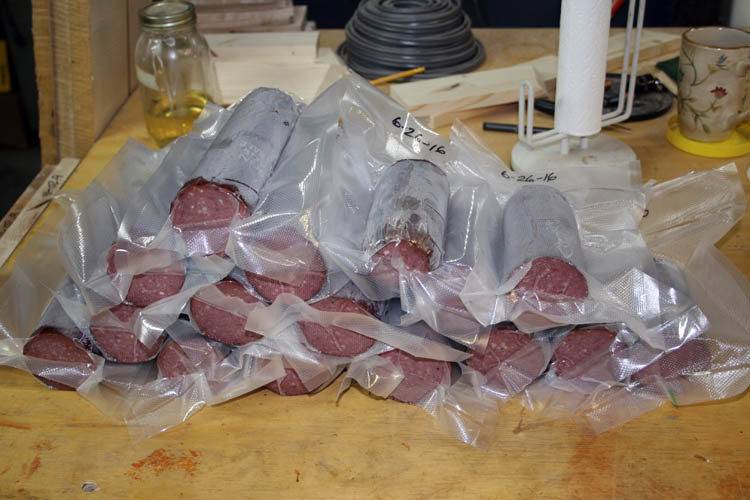
Web published update by Bill aka Mickey Porter on 06-26-16.
CLEANING THE SMOKE GENERATOR
The only disadvantage to this type of smoke generator is the build up of
tar inside the canister wall, wire screen mesh basket, etc. It took an
hour or more of some serious scrubbing with brushes after soaking the
various components with Super Clean cleaner and degreaser. I did a
couple test runs with it with the canister wire basket about 3/4 the way
filled up and filled the canister (wire basket) two times during the process
of the above 30 pound batch of Venison Summer Sausage - Cajun Blend.
Nevertheless, the pros far out way the cons of this smoke generator.
The thin wall canister needs to be about twice as thick or at least .062
wall thickness in my humble opinion since where you ignite the fuel source,
the canister wall is deformed by the heat which so far hasn't been a problem
and only cosmetic.
At the next cleaning, I will take some close-up pixs of the accumulation
of tar before cleaning.
Web published update by Bill aka Mickey Porter on 07-03-16.
LEAVING ON A
SPIRITUAL NOTE
If you do not know Jesus Christ as your Lord and Savior, please take
this moment to accept him by Faith into your Life, whereby Salvation
will be attained.
Ephesians 2:8 - 2:9 8 For by grace are ye saved through
faith; and that not of yourselves: [it is] the gift of God: 9 Not of
works, lest any man should boast.
Hebrews 11:1 “Now faith is the substance of things hoped for,
the evidence of things not seen.”
Romans 10:17 “So then faith cometh by hearing, and hearing by
the word of God.”
Open this
link about faith in the King James
Bible.
Romans 10:9 “That if thou shalt confess with thy mouth the
Lord Jesus, and shalt believe in thine heart that God hath raised him
from the dead, thou shalt be saved.”
Open this
link of Bible Verses About Salvation,
King James Version Bible (KJV).
Hebrews 4:12 “For the word of God is quick, and powerful, and
sharper than any two edged sword, piercing even to the dividing asunder
of soul and spirit, and of the joints and marrow, and is a discerner of
the thoughts and intents of the heart.”
Romans 6:23 “For the wages of sin is death; but the gift of
God is eternal life through Jesus Christ our Lord.”
Romans 3:23 “For all have sinned, and come short of the glory
of God;”
Micah 6:8 “He hath shewed thee, O man, what is good; and what
doth the LORD require of thee, but to do justly, and to love mercy, and
to walk humbly with thy God?”
Philippians 4:13 "I can do all things through Christ which
strengtheneth me."


